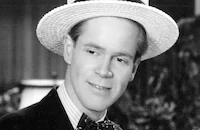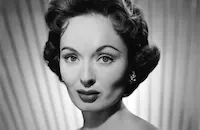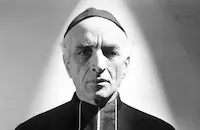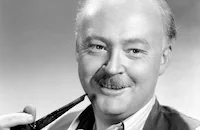Another Part of the Forest

Brief Synopsis
Cast & Crew
Michael Gordon
Fredric March
Dan Duryea
Edmond O'brien
Ann Blyth
Florence Eldridge
Film Details
Technical Specs

Synopsis
A small Alabama town celebrates Confederate day as middle- aged housewife Lavinia Hubbard watches from the nearby woods. As part of the celebration, which is led by Colonel Isham, a monument commemorating the fifteenth anniversary of the betrayal and slaughter of twenty-seven local soldiers during the Civil War is dedicated. During the ceremony, the colonel asks Lavinia's son Oscar, who is accompanied by his dance-hall girl friend Laurette Sincee, to leave. In town, meanwhile, Lavinia's husband Marcus ignores the proceedings and is joined in his merchantile shop by his oldest son Ben, who has just returned from an unsuccessful business trip to Birmingham. Having been unable to purchase valuable Birmingham coal stock, Ben hopes to interest wealthy Horace Giddons in supporting his business venture by arranging a marriage between Giddons and Ben's younger sister Regina. Marcus, who acquired a fortune profiteering in salt during the war, refuses to give Ben money, and dismisses the idea of an arranged marriage for Regina. Regina, meanwhile, meets her lover, John Bagtry, a veteran still haunted by the war, who she hopes will marry her and take her to Chicago. That evening at dinner, only the maid, Coralee, remembers it is Lavinia's birthday, as Marcus and Ben are busy arguing about Giddons, and Oscar is relaying the news that Northern carpetbagger Sam Taylor is offering to make a loan to the Bagtry family. Lavinia reminds Marcus that he has promised repeatedly to give her money to start a hospital for the town's poor, but Marcus ignores her and takes a walk with Regina, who asks to go to Chicago. Later, Marcus orders Oscar to stop Taylor from proceeding with the Bagtry loan, hinting that he will give Oscar the money he needs to marry Laurette if he does. Oscar arranges with the Ku Klux Klan to beat up Taylor, who then leaves town. The next day at the store, John's sister Birdie asks Ben about the possibility of a loan, as her family's cotton business is failing and John needs money to join a war in Brazil. Ben invites the two for dinner and when he tells Marcus about Birdie's request, raises the loan amount, intending to pocket the difference. Oscar convinces Marcus to allow him to bring Laurette to dinner and that evening as Ben spikes Laurette's punch and negotiates separately with Marcus and Birdie, Regina confronts John about marriage. After John admits he is waiting for the loan so he can join the fighting in Brazil, Regina, realizing why Ben is anxious to lend the money, angrily informs Marcus that her brother has lied about the amount. Despite Birdie's pleadings, Marcus turns down the request. When Laurette, now drunk, becomes shrill and insulting, Marcus then tells Oscar he will give him a thousand dollars to leave the house for good. In retaliation against Regina, Ben tells his father about her plans to marry John and, over Lavinia's protests, Marcus demands that Ben leave the house too. The next day Lavinia again pleads with Marcus not to break up the family, and when he resists, she intimates she can blackmail him. Ben forces her to confess that Marcus was an informer during the war, and was responsible for sending the town soldiers to their death. Threatening to reveal the truth to the entire town, Ben gets Marcus to sign over the entire family fortune to him. Oscar and Regina quickly switch their alliances to Ben, and when Lavinia realizes he is as selfish and cruel as Marcus, she leaves to return to her family.

Director
Michael Gordon
Cast

Fredric March

Dan Duryea

Edmond O'brien

Ann Blyth

Florence Eldridge

John Dall

Dona Drake
Betsy Blair

Fritz Leiber

Whit Bissell

Don Beddoe
Wilton Graff
Virginia Farmer
Libby Taylor
Smoki Whitfield
Rex Lease
William Challee
Edmund Cobb
George Slocum
Matilda Caldwell
Crew
Daniele Amfitheatrof
John Austin
Jeanette Bate
Robert Boyle
Jerry Bresler
Leslie I. Carey
Milton Carruth
Ben Chapman
Richard De Weese
Carmen Dirigo
Russell A. Gausman
John Hambleton
Bernard Herzbrun
Hal Mohr
Vladimir Pozner
David Tamkin
Bud Westmore
Yvonne Wood

Film Details
Technical Specs

Articles
Another Part of the Forest
Buoyed by the success of that film, Hellman wrote a "prequel" about the nasty Hubbard family, showing the characters many years earlier and depicting the roots of the family's problems and machinations. Hellman herself directed the Broadway production of Another Part of the Forest, which opened in November 1946. It was not quite the commercial success of its predecessor, running for 182 performances, but it was well-received critically, earning among other awards a Tony for Patricia Neal in her Broadway debut as the younger version of Regina Hubbard, the lead character from The Little Foxes created by Tallulah Bankhead on stage and Bette Davis on film.
When Universal bought the film rights to the play for its 1948 release, Hellman was not hired to adapt the script. That was entrusted to Vladimir Pozner, who had received an Oscar nomination for his original story for The Dark Mirror (1946), his sophomore screenwriting effort. The Little Foxes had been brought to the screen by the esteemed director William Wyler, but this follow-up was entrusted to Michael Gordon, who up to this point had only directed low-budget crime thrillers. A couple years later he would guide José Ferrer to an Oscar-winning performance in Cyrano de Bergerac (1950), but Gordon's career was truncated by the Hollywood Red Scare of the 1950s. When he finally returned to feature film directing, he took on light romantic comedies, notably the Doris Day vehicles Pillow Talk (1959) and Move Over, Darling (1963), and the Lana Turner melodrama Portrait in Black (1960).
Although not the box office success of the earlier Hellman film about the Hubbard family, the prequel did garner some good reviews. The New York Times called it "a compelling entertainment" and praised Pozner's screen treatment and Gordon's direction. Time magazine said Gordon's work was a "nearly perfect example of how to film a play. There is hardly a shot which does not set up visual tension against the lashing, steel-spring dialogue; there is not a single performance which is short of adequate."
Pozner received a Writers Guild of America nomination for Best Written American Drama and another for Screenplay Dealing Most Ably with Problems of the American Scene.
Ann Blyth, best known to audiences up to this time as the scheming Veda in Mildred Pierce (1945), plays the Bankhead-Davis character as a young woman getting a lesson in shrewdness and amorality from her older brothers Oscar (Dan Duryea, playing the father of the character he played in The Little Foxes) and Ben (Edmond O'Brien) and their father Marcus, a businessman who got rich on shady deals during the Civil War. Marcus is played by Fredric March and his long-suffering wife Lavinia by March's real-life wife, Florence Eldridge, the first time the two played spouses on screen but not their first film together. Although she stayed busy on stage, Eldridge had not acted in a movie since her role as Queen Elizabeth I in the Katharine Hepburn vehicle Mary of Scotland (1936), which also featured March as Hepburn's love interest.
Some sources claim Hellman had intended to make her story of the Hubbard family a trilogy, but she never completed a third installment.
Director: Michael Gordon
Producer: Jerry Bresler
Screenplay: Vladimir Pozner, based on the play by Lillian Hellman
Cinematography: Hal Mohr
Editing: Milton Carruth
Art Direction: Robert Boyle, Bernard Herzbrun
Music: Daniele Amfitheatrof
Cast: Fredric March (Marcus Hubbard), Dan Duryea (Oscar Hubbard), Edmond O'Brien (Ben Hubbard), Ann Blyth (Regina Hubbard), Florence Eldridge (Lavinia Hubbard)
By Rob Nixon

Another Part of the Forest
Quotes
Stop cryin' over your food, Lavinia...if you want it to remain unsalted.- Marcus Hubbard
How do I look, honey?- Regina Hubbard
Bright and shiny, honey, like a nice new two-bit piece.- Ben Hubbard
Try to remember that though ignorance becomes a Southern gentleman, cowardice does not.- Marcus Hubbard
Trivia
Notes
Another Part of the Forest was adapted from Lillian Hellman's Broadway play of the same title. Although written after The Little Foxes, Another Part of the Forest is narratively a "prequel" to that play, covering the early years of the "Hubbard" family. Dan Duryea, who portrays "Oscar Hubbard" in Another Part of the Forest, played Oscar's son "Leo" in The Little Foxes. According to modern sources, Hellman intended to write a trilogy on the Hubbards, but the third part was never written. The film marked the first time that real-life husband and wife Fredric March and Florence Eldridge played spouses on the screen. The film also marked Eldridge's return to the screen for the first time since 1936, when she portrayed Queen Elizabeth II in RKO's Mary of Scotland, which also starred March. See AFI Catalog of Feature Films, 1931-40; F3.2772. Ann Blyth recreated her role as "Regina" for a Lux Radio Theatre broadcast on September 13, 1948.
















